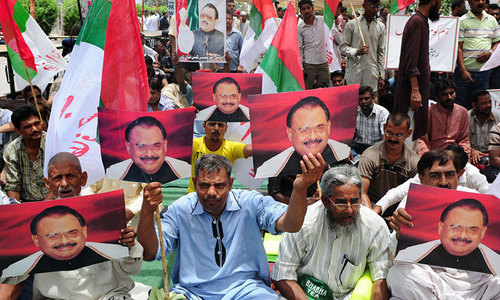While Muttahida Qaumi Movement supremo Altaf Hussain has accepted the decision of his Karachi-based coordination committee to operate the party from Pakistan and formally surrendered all powers to them, uncertainty prevails in the rank and file about the future role of the London-based leader as many think the success of the soft revolt led by Dr Farooq Sattar hinges on the treatment his cadre gets from the military establishment.
The MQM leadership in Pakistan, however, holds a unanimous view that their acceptability to the masses, or the Muhajir community, largely depends on Mr Hussain’s future actions as he still wields control over his followers. They can take on any individual or group if they perceive that they are working against the MQM supremo. This is why Dr Sattar did not openly condemn or criticise Mr Hussain at his press conference on Tuesday.
Senior leaders and lawmakers of the MQM were not optimistic for the future even after the overwhelming victory of the MQM’s candidates in the mayoral election. They were unsure whether the establishment will allow them to work as a party from its Nine-Zero headquarters, which they say has an irreplaceable symbolic value for every Muhajir who supports the Muttahida.
In an apparent move to end the confusion that arose after a statement by MQM leader Wasay Jalil that Mr Hussain would continue to endorse decisions of the coordination committee, the MQM chief himself issued a statement from London in the early hours of Wednesday morning, saying he had decided to hand over all powers to the coordination committee. And once again he apologised to the people of Pakistan for hurting their sentiments in his speech.
“I respect the views expressed by senior MQM leader Dr Sattar and others at their press conference and hand over all decision-making and organisational matters to the coordination committee,” Mr Hussain said, adding: “I will pay special attention to my health on the advice of the coordination committee.”
But some of the leaders whom Dawn spoke to believe sooner or later they will have to either say goodbye to the MQM and form a new group or stay within the MQM and totally disown Mr Hussain — a hint earlier given by Dr Sattar at the press conference that he and others may form another party if “there’s another MQM which believes in Pakistan-bashing”.
Although none of them tried to justify the anti-Pakistan remarks of Mr Hussain in his speech on Monday, a former member of the MQM coordination committee said several other political leaders had also spoken out against the country, but no office of any party was ever sealed.
And the way a former mayor of Hyderabad was produced in court for remand also shows the double standards of the Pakistani establishment, he added.
He advised the powers that be to realise that such things only provided fodder to those in the MQM who are keen to exploit the anti-establishment sentiments prevailing among the youth in Sindh’s urban areas.
But he was full of praise for Dr Sattar for what he called divorcing the MQM’s London secretariat. However, he was sceptical of their success. “He will not allow them to function,” he said in a reference to the London-based supremo.
These views were echoed by an MQM lawmaker. He repeated Dr Sattar’s assertions at Tuesday’s press conference that “we are the MQM and we will take all decisions in Pakistan”.
“But Altaf Hussain is a father figure and no one can dispense with his role. Let’s admit nobody can function without his support. So if you want stability there is a dire need of putting an end to the ‘unjust and one-sided’ operation against MQM and to address other grievances of the urban community,” he said.
“I don’t see myself and many like-minded people in the MQM if the London [office] tries to influence our decisions,” he said, reflecting a fear that Mr Hussain will “react” since he considers the act of Dr Sattar and his followers a rebellion and an attempt to overthrow him and offered an apology or even handed over powers to the coordination committee as an strategic retreat.
Many think Mr Hussain already knew that something was cooking up in the Karachi MQM and a rebellion was in the offing. The foul language he often used against senior leaders was aimed at forcing them to either become inactive or to switch their loyalty to the party led by former Karachi Mayor Mustafa Kamal.
"We all know the moment we leave MQM we will become a traitor in the eyes of Muhajirs," a senior leader said, citing the example of Mr Kamal's failure to gain public support against he MQM supremo.
"Monday's speech provides everyone an opportunity to stand against him (Altaf Hussain) while staying in the MQM as you cannot find even one activist in Pakistan who defends his speech."
At present, Mr Hussain and his London office have no role in MQM-Pakistan ─ a registered party whose head has been Dr Farooq Sattar since 2013 ─ but that doesn't mean there is any dearth of his loyalists here or across the globe.
If experience is anything to go by, its only a matter of time before Mr Hussain starts complaining to his followers that the Karachi-based leadership betrayed him and they should rise up against them. It's not smooth sailing for Dr Sattar.
Published in Dawn, August 25th, 2016













































